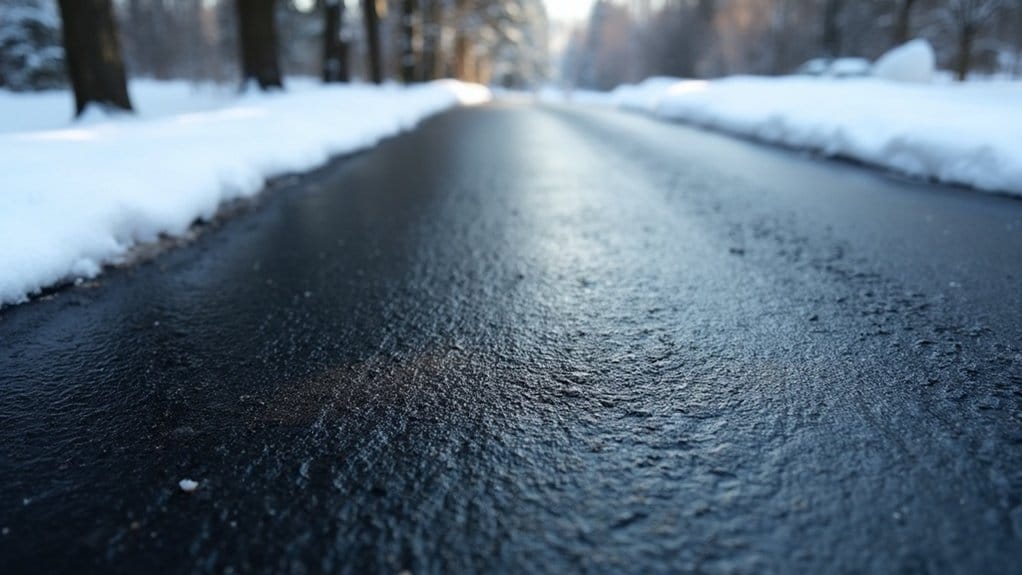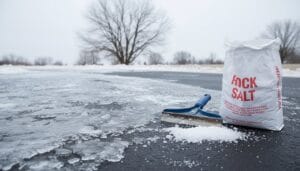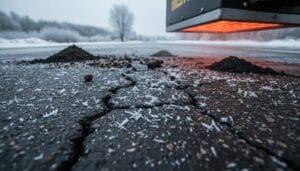To protect your asphalt driveway this winter, start with professional sealcoating in late fall when temperatures are still above 50°F. Remove snow promptly before it exceeds 2 inches and use plastic shovels or snowblowers with raised blades to prevent surface damage. Switch to magnesium chloride or potassium chloride de-icers instead of harmful rock salt.
Direct water drainage away from your driveway and fix small cracks immediately with hot asphalt filler. Remember to rotate parking positions to avoid stress points and use plywood boards under heavy equipment.
These preventive steps will save you thousands in future repairs – and there’s even more you can do to maximize your driveway’s lifespan.
Key Takeaways
- Apply sealcoating before winter to create a protective barrier against moisture infiltration and freeze-thaw damage.
- Remove snow promptly using plastic shovels or raised snowblowers to prevent weight and moisture accumulation.
- Use magnesium chloride or potassium chloride de-icers instead of corrosive sodium chloride to protect the asphalt surface.
- Direct water drainage away from the driveway and promptly remove standing water to prevent freeze damage.
- Repair all existing cracks before winter using hot asphalt fillers to prevent water infiltration and further deterioration.
Professional Sealcoating Before Winter
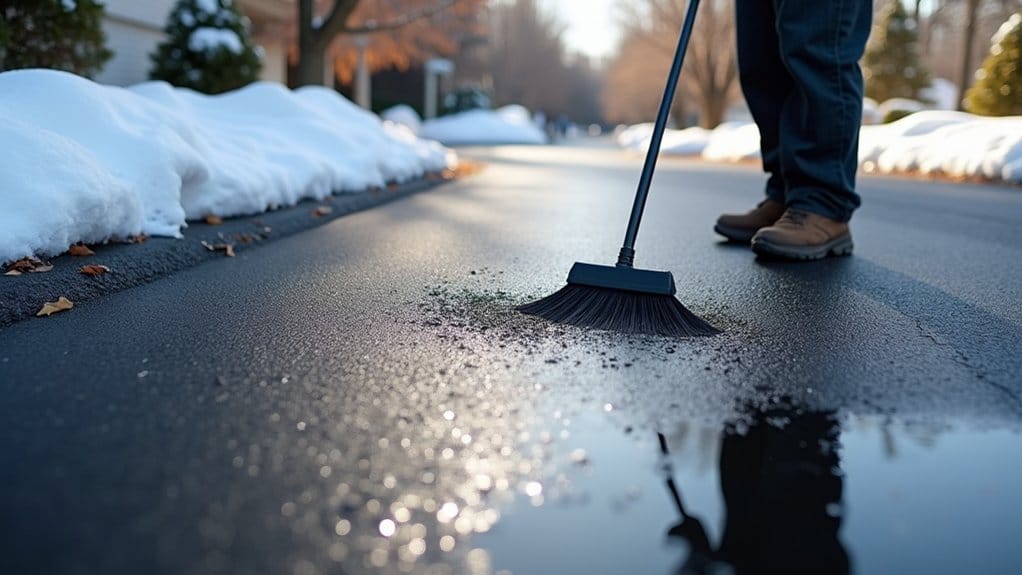
Anyone considering asphalt driveway maintenance should prioritize professional sealcoating before winter sets in. The timing of this essential service is absolutely critical for maximum winter preparation benefits!
Perfect Timing Matters
You’ll want to schedule sealcoating when temperatures stay above 50°F. Late spring through early fall offers ideal conditions. Your contractor needs warm temperatures and low humidity for the best results. Emergency repairs may be needed if maintenance is skipped. It’s essential to choose a reliable paving company that can ensure quality application.
Amazing Winter Protection Benefits
Sealcoating creates a powerful barrier against moisture infiltration. You’ll love how it shields your driveway from the dreaded freeze-thaw cycle. This protection can save you thousands in future repair costs!
What You’ll Get
- A protective shield that lasts 2-4 years
- Enhanced resistance against water damage
- Stronger defense against winter’s harsh effects
- Beautiful curb appeal that lasts
Schedule Smart
Don’t wait until it’s too cold! Your sealcoat needs 24 hours to dry properly. Plan ahead and verify you’re working with temperatures above 55°F.
Remember – you can’t apply sealcoating during winter months. Getting this done before the cold hits is your best defense against winter damage.
Remove Snow Early and Often
Every homeowner’s winter battle against snow requires swift and consistent action to protect asphalt driveways.
You’ll need to tackle snow accumulation before it becomes a major problem. Don’t wait – remove snow early and remove it often!
Smart Snow Removal Tactics
- Use a plastic shovel or snowblower with raised blades
- Keep your shovel at a shallow angle while pushing
- Clear snow before it reaches 2 inches in depth
- Mark your driveway edges with reflective guides
Ice Management Done Right
Skip the harmful salt! Instead, use sand or cat litter for traction. Your driveway will thank you for avoiding chemical damage. Professional services can provide expert guidance on proper ice management techniques during challenging winter conditions. Regular sealcoating contributes significantly to protecting your driveway against winter wear.
Why This Matters
Your quick action prevents the dreaded freeze-thaw cycle. When water seeps into small cracks and freezes, it expands.
This creates bigger cracks and eventually leads to costly repairs.
Pro Tips for Success
- Remove debris before snowfall
- Direct downspouts away from your driveway
- Inspect for existing cracks regularly
- Consider hiring professionals for heavy snow
Remember: Every inch of snow you remove promptly is an investment in your driveway’s future!
You’re not just clearing snow – you’re protecting your significant asphalt from winter’s harsh effects.
Choose The Right De-Icing Products
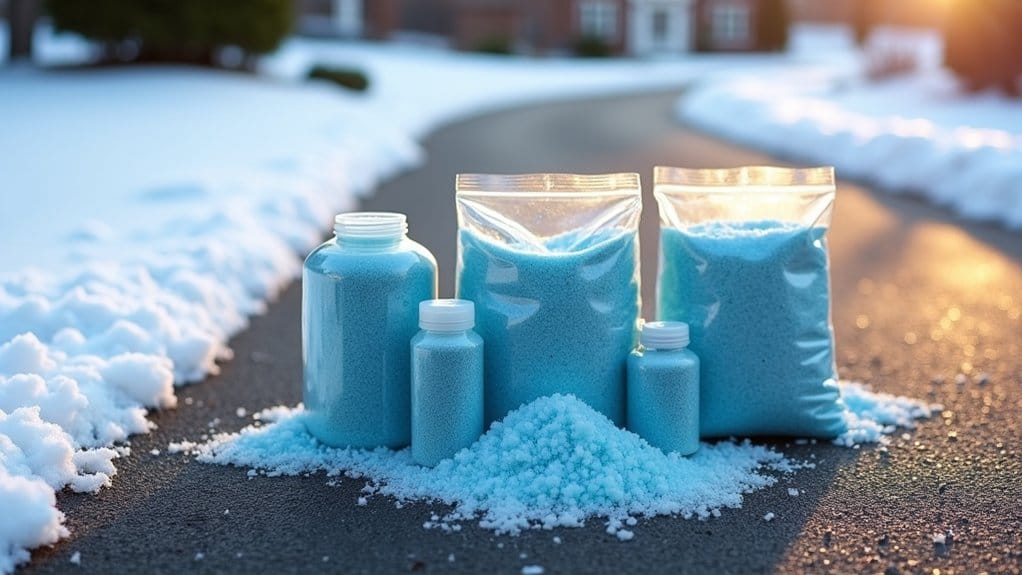
Selecting the right de-icing products for your asphalt driveway can mean the difference between winter safety and costly surface damage. Your choice of de-icing methods impacts both your driveway’s longevity and the environment. Using liquid deicer solutions allows for easy application with a simple garden sprayer. Nathan’s Paving & Seal Coating emphasizes the importance of using top-grade materials to ensure the best outcomes for your driveway.
Safe and effective options for asphalt include magnesium chloride and potassium chloride. These products work well in cold temperatures while minimizing environmental impact. Calcium magnesium acetate (CMA) is another excellent choice. It’s biodegradable and gentle on your driveway’s surface.
Here are three essential steps for proper de-icing application:
- Apply products before snowfall to prevent ice bonding
- Spread in light, even layers to avoid surface damage
- Choose temperature-appropriate products for maximum effectiveness
Avoid using excessive sodium chloride (rock salt). It’s corrosive and harmful to vegetation! Instead, focus on environmentally friendly options like magnesium chloride. It works down to -13°F and won’t harm your plants.
Remember to spot-treat high-traffic areas rather than over-applying. This targeted approach saves money and protects your driveway.
Proper Snow Removal Equipment
Beyond choosing the right de-icing products, proper snow removal equipment plays a key role in protecting your asphalt driveway.
Let’s explore the most effective snow removal techniques for your driveway!
Essential Equipment
- Invest in a snowplow with polyurethane or rubber edges – it’s gentler on your asphalt
- Get a snow blower for those heavy snowfalls (set it to the lowest height)
- Keep plastic shovels handy for light snowfall days
Smart Usage Tips
You’ll want to match your snowplow types to your specific needs. For steep driveways, tracked snow blowers are your best friend!
They’re fantastic at handling wet, slick conditions.
Protection Strategies
Don’t let enthusiasm lead to over-scraping! Here’s what to remember:
- Always clear debris before snowfall
- Remove snow before it compacts
- Skip those metal shovels – they’re asphalt’s enemy
- Keep the plow blade slightly raised
Pro tip: If you’ve got a long driveway, a quality snow blower is worth every penny.
It’ll save your back and your asphalt!
Remember: Gentle, consistent removal is better than aggressive scraping. Your driveway will thank you with fewer cracks and longer life! Additionally, regular parking lot sealing can further protect your asphalt from seasonal damage.
Monitor Surface Water Drainage
Water wreaks havoc on asphalt driveways when it’s not properly managed. Standing water can seep into cracks and trigger a destructive cycle of damage. You’ll need effective drainage solutions to protect your investment!
Your drainage system needs regular attention to prevent costly repairs. Start by checking your gutters and downspouts. Make sure they’re directing water flow at least 3-4 feet away from your driveway. Clean them regularly to prevent clogs that could cause overflow onto your asphalt.
Here are three critical steps to manage surface water:
- Edge your driveway regularly to allow water to flow freely off the sides.
- Remove standing water immediately using a squeegee after rain.
- Install proper drainage channels if you notice recurring puddles.
Don’t ignore pools of water on your driveway! They’re not just unsightly – they’re dangerous for your asphalt.
When water freezes and thaws repeatedly, it expands cracks and creates potholes. Keep an eye on how water moves across your driveway during rainfall. If you spot areas where water collects, address these drainage issues promptly. Your driveway’s longevity depends on proper water management, as regular sealcoating can provide added protection against environmental damage!
Regular Inspection and Maintenance
Regular inspection and maintenance serve as your driveway’s first line of defense against costly repairs. You’ll need to establish a consistent inspection frequency to catch problems early. Make it a habit to examine your driveway monthly for visible signs of wear.
Key Inspection Steps:
- Walk your entire driveway surface systematically
- Look for fine cracks (even barely visible ones)
- Check edges for erosion and damage
- Identify areas where water pools
- Document any changes from previous inspections
Your damage assessment should guide immediate action. Don’t wait to address issues! Small cracks today become expensive repairs tomorrow.
Maintenance Essentials:
- Seal coat every 3 years – mark it on your calendar
- Fill potholes immediately when they appear
- Apply crack filler to prevent water damage
- Limit heavy vehicle traffic when possible
- Choose water-based sealers over oil-based options
Pro tip: Schedule professional inspections annually. Paving crews can spot subtle problems you might miss. They’ll help you develop a targeted maintenance plan that matches your driveway’s specific needs. Additionally, consider utilizing trusted asphalt paving services to address any significant issues you discover during your inspections.
Remember: Prevention beats repair every time! Your consistent attention now saves thousands in future repairs.
Address Small Cracks Immediately
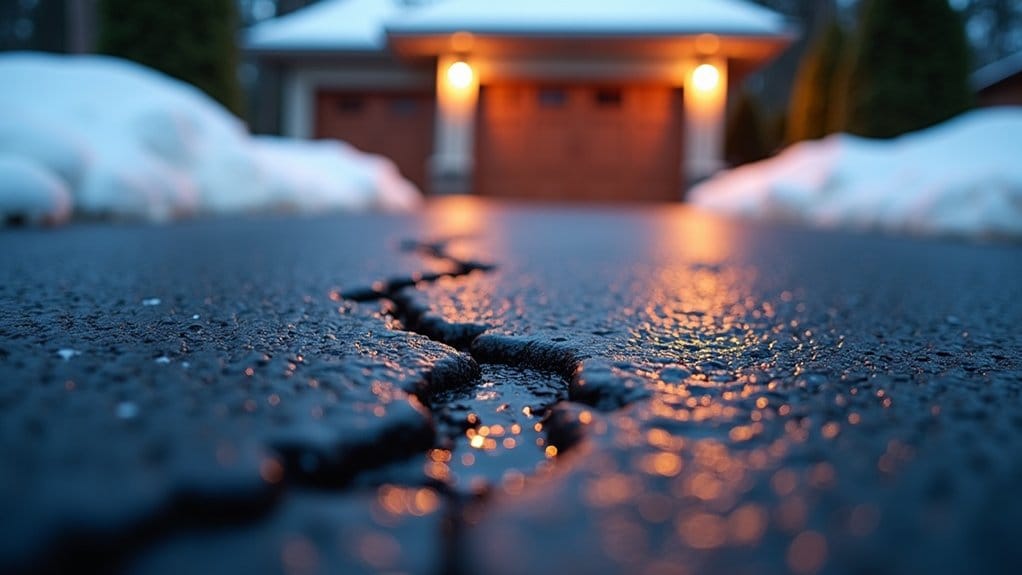
- Water seepage leads to devastating freeze-thaw damage
- Small cracks quickly evolve into costly potholes
- Repair costs multiply when you delay maintenance
Your best defense is immediate action with the right materials. Use hot asphalt fillers for best results in warmer conditions. They’re more effective than cold fillers for long-term protection.
Just remember to clean those cracks thoroughly before applying any filler!
Not sure about your repair skills? Don’t risk it! Professional contractors have specialized tools and knowledge for lasting results. They’ll guarantee proper application and help prevent future issues. With over 10 years of industry experience, they can ensure expert craftsmanship that extends your driveway’s lifespan.
Remember: Every small crack you fix today saves you money tomorrow. It’s like giving your driveway a protective shield against winter’s harsh assault.
Take action now to maintain your driveway’s integrity and appearance. Your future self will thank you when spring arrives!
Protect Against Salt Damage
Salt’s destructive power poses a serious threat to your asphalt driveway during winter months. The corrosive nature of traditional rock salt can accelerate wear and tear, leading to costly repairs.
Let’s protect your investment with smart strategies!
Seal for Success
- Apply a high-quality sealcoat every 2-3 years
- Schedule sealcoating before winter hits
- Choose professional-grade products for maximum protection
Reduce Salt Exposure
You’ll love these effective alternatives to traditional salt:
- Switch to eco-friendly alternatives like calcium chloride
- Sprinkle sand for added traction
- Install proper drainage systems to divert salty runoff
Smart Winter Tactics
Take control of winter maintenance with these proven methods:
- Clear debris before snowfall
- Shovel regularly to minimize ice buildup
- Consider a heated driveway system for ultimate protection
Pro Prevention Tips
Your best defense is a strong offense:
- Repair all cracks before winter arrives
- Use porous asphalt for better drainage
- Apply heavy-duty sealants in high-traffic areas
Remember: Every dollar spent on prevention saves $10 in repairs! Additionally, investing in regular maintenance services ensures the longevity of your asphalt surfaces.
Your driveway will thank you for choosing these protective measures.
Maintain Proper Weight Distribution
Protecting against damage from heavy loads starts with understanding how weight affects your asphalt driveway. Your driveway’s weight distribution capacity depends on several factors, including thickness, base preparation, and environmental conditions.
To maximize your driveway’s longevity, follow these essential weight management practices:
- Rotate your vehicle’s parking position regularly to prevent concentrated stress points.
- Use plywood boards under heavy equipment or RV stabilizers.
- Never exceed your driveway’s recommended weight capacity (get load testing if unsure).
Don’t let changing weather conditions catch you off guard! Hot summer days can soften your asphalt, while freezing temperatures make it brittle. You’ll want to be extra careful with weight distribution during these extreme conditions.
For heavy vehicles like RVs or construction equipment, consider getting professional load testing done. This will help you understand your driveway’s exact weight-bearing limits. Remember – a standard 2-inch residential driveway isn’t designed for constant heavy loads.
The key to success? Think strategically about weight distribution! Move vehicles around, use support platforms, and always consider weather conditions when parking heavy equipment. Additionally, maintaining proper asphalt surfaces through seal coating services can further enhance durability and prevent damage.
Winter Weather Preparation Steps
While managing weight distribution helps prevent damage year-round, winter brings its own set of challenges for asphalt driveways.
Getting your surface ready for harsh weather requires careful planning and proper maintenance steps.
Start Your Winter Prep Early:
- Give your driveway a thorough cleaning to remove leaves and debris
- Check driveway drainage patterns to prevent water pooling
- Repair small cracks before they expand in freezing temperatures
- Apply a fresh sealcoat if it’s been 2-4 years since the last application
Smart Winter Care Tips:
- Use plastic snow shovels instead of metal ones
- Skip the rock salt! Choose gentler de-icers like magnesium chloride
- Keep winter debris cleared regularly to prevent surface damage
- Monitor for new cracks after each freeze-thaw cycle
Don’t forget to address existing problems before winter hits!
Those tiny cracks you see now can become major headaches when temperatures drop.
If you’re uncertain about proper repair techniques, don’t hesitate to call a professional. They can provide expert asphalt paving repair to ensure your driveway gets the right treatment to withstand winter’s worst.
Remember – prevention is always cheaper than repairs!
Conclusion
An ounce of prevention is worth a pound of cure when it comes to your driveway! You’ll save thousands by taking action now to protect your asphalt investment. Start with professional sealcoating and stay vigilant with snow removal this winter. Don’t wait until spring reveals expensive damage. Follow these proven maintenance tips, and you’ll keep your driveway crack-free through winter’s worst. Your future self will thank you!
Protect Your Driveway This Winter – Get a Free Quote Today!
As winter approaches in Central PA, ensuring your asphalt driveway is in top shape is crucial. Nathan’s Paving specializes in professional sealcoating that creates a protective barrier against moisture and freeze-thaw damage. Don’t wait until it’s too late! Take control of your driveway’s future by addressing small cracks and scheduling a sealcoat before it gets too cold.
Ready to safeguard your investment? Reach out today for a free quote and let our experts help keep your driveway looking great all winter long. Get your free quote now! Discover more about our seal coating services and ensure your asphalt is protected.
